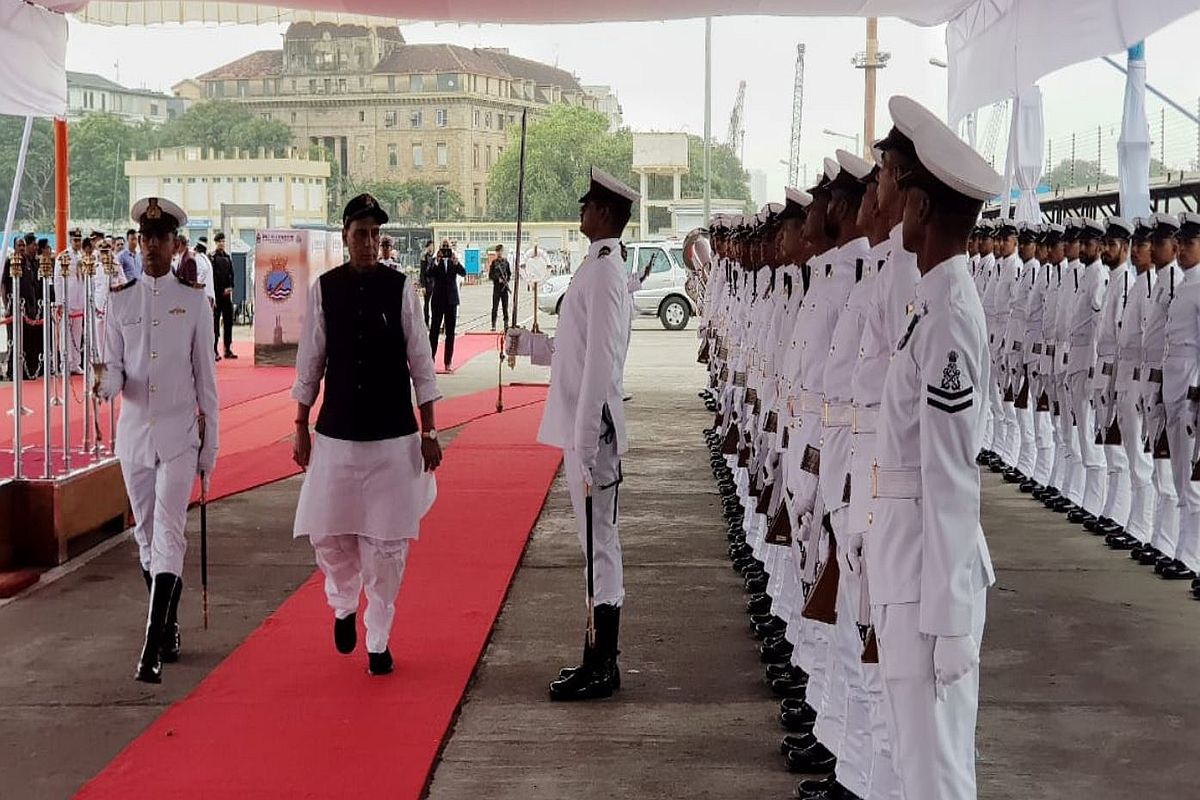First rear fuselage for LCA Mk1A handed over to HAL
The fuselage is the primary structure of an aircraft that houses the cockpit, crew, passengers, and cargo. The rear fuselage, specifically, supports the tail section and its vital components.
Singh was referring to the repeated attempts by Pakistan PM Imran Khan to internationalise the Kashmir issue, which India considers as its ‘internal matter’.
SNS | New Delhi | September 28, 2019 1:05 pm

Defence Minister Rajnath Singh at the commissioning ceremony of India's second Scorpene-class submarine, INS Khanderi, at the dockyard of the Mazgaon Dock Shipbuilders Limited in Mumbai. (Photo: Twitter | @indiannavy)
Taking a swipe at Imran Khan, Union Defence Minister Rajnath Singh on Saturday said that the Pakistani Prime Minister is going door-to-door and creating content for cartoonists.
Singh was referring to the repeated attempts by Pakistan PM Imran Khan to internationalise the Kashmir issue, which India considers as its “internal matter”.
Advertisement
His comments came a day after Khan raised the Kashmir issue at the 74th UN General Assembly session and demanded that India lift the “inhuman curfew” in Kashmir and release all “political prisoners”.
Advertisement
Khan also repeated his war rhetoric saying that if there was a face-off between two nuclear-armed neighbours, the consequences would be far beyond their borders.
Giving his scenario for war, Imran Khan said that when the “curfew” is lifted in Kashmir there will be a bloodbath.
Speaking after commissioning India’s second Scorpene-class submarine, INS Khanderi, at the dockyard of the Mazgaon Dock Shipbuilders Limited in Mumbai, Union Minister Rajnath Singh said there are some powers who want to do a Mumbai-like attack on Indian coastal regions, but “their desires will not be allowed to be fulfilled”.
“Pakistan needs to understand that the Indian Navy has become much stronger with the commissioning of the INS Khanderi, and the government is committed to strengthen and modernise the armed forces,” he said, adding that “India was now capable of giving much bigger blow to it”.
Singh further asserted that the Navy will take strict action against those who disturb peace in the region.
Hitting out at Imran Khan, half of whose speech was on India at the UNGA, Singh asserted that abrogation of Article 370 was a progressive step. “While our progressive steps in Jammu and Kashmir are receiving global support, the Pakistani PM has been running around door-to-door around the world and creating content for cartoon makers.”
On the ‘Howdy, Modi’ event in Houston, Singh said that Prime Minister Narendra Modi’s recent visit to the US “showcased India’s emergence as a superpower”.
“We witnessed how the Prime Minister was welcomed by top leaders of the US at a jam packed stadium. President Donald Trump has also acknowledged the potential of our government,” Rajnath Singh said.
On the submarine’s commissioning, he said, “It is a matter of immense pride that India is one of the few countries which can build its own submarines.”
The INS Khanderi is the second attack submarine that has been commissioned into the Indian Navy under the P-75 project. In 2017, another submarine INS Kalvari had already been inducted into the Navy. The conventional submarine has been manufactured by Mazagon Dock Shipbuilders Limited in Mumbai.
The Scorpene-class submarine possesses superior stealth and other major combat capabilities. It can attack with torpedoes as well as tube-launched anti-ship missiles whilst underwater or on the surface.
The first Scorpene-class submarine INS Kalvari was commissioned into the Navy by PM Modi in December 2017. On the occasion, PM Modi had said INS Kalvari was an excellent example of ‘Make in India’ and will boost the might of the Indian Navy.
A contract with French company Naval Group (earlier called DCNS) was signed in 2005 for the supply of six submarines. The submarines, designed by the French naval defence and energy company, are being built by MDL as part of Project-75 of the Indian Navy. According to senior Navy officials, the cost of the Scorpene project now stands at around Rs. 25,000 crore.
Rajnath Singh has minced no words in attacking Pakistan and had even warned the neighbouring country earlier that it would be split into pieces if it continues with the practice.
Earlier this month, Singh, while addressing a defence dialogue in the South Korean capital of Seoul had said that India will not balk at using its strength to defend itself.
Rajnath Singh had earlier also stated that should bilateral talks happen, it would not be about Jammu and Kashmir, but on Pakistan-occupied Kashmir, the territory under Pakistan’s control since it invaded the region in 1947.
Following Pakistan’s unilateral decisions of downgrading diplomatic ties with India, Rajnath Singh had made an intriguing statement saying that India’s nuclear policy till date has been ‘No First Use’ but “what happens in future depends on the circumstances”.
Islamabad has been repeatedly trying to internationalise the Centre’s move to abrogate provisions of Article 370.
After its failure at the United Nations Human Rights Council session in Geneva, Pakistan had attempted to target India at UNGA in New York.
Advertisement
The fuselage is the primary structure of an aircraft that houses the cockpit, crew, passengers, and cargo. The rear fuselage, specifically, supports the tail section and its vital components.
Defence Minister Rajnath Singh on Sunday asserted that the aerospace sector is going to witness an unprecedented growth in times to come and it will be pivotal in realising Prime Minister Narendra Modi-led NDA Government’s vision of Viksit Bharat by 2047.
The Indian Navy marked the induction of its eighth Missile Cum Ammunition (MCA) barge, LSAM 11 (Yard 79), in a ceremonial event held at the Naval Dockyard, Mumbai, today.
Advertisement
